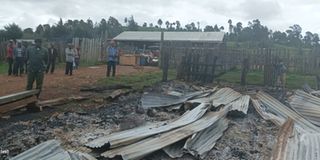Premium
Arson-hit areas set for peace talks

Houses razed down by suspected arsonists at Muchorwe village past Burnt Forest area, close to the multi border of Uasin Gishu, Nandi, Kericho and Baringo counties.
The Rift Valley has been the epicentre of ethnic clashes almost every election cycle over the years. When the polls draw closer, some residents take extra precautions, including relocating to other areas.
Diverse political opinions, disputed election results and the emotive issue of land, remain the main causes of violence. Security is customarily beefed up in areas mapped as violence hotspots to avert possible chaos.
Before August 9 elections, the National Cohesion and Integration Commission (NCIC) listed 23 counties, including Uasin Gishu, as possible violence hotspots. The government put in place stringent measures to prevent lawlessness.
But that was not the case in Timboroa, Uasin Gishu. More than 10 houses were set ablaze by unknown arsonists in three villages days before the presidential results were announced.
While two houses were razed in Chagaiya village and another in Chemare last week, 10 others were reduced to ashes in Muchorwe on Monday after the results were declared.
More than 10 families were displaced and property of unknown value lost. But the police described the fires as “ordinary incidents”, saying they were not connected to the elections.
Officers from the General Service Unit (GSU) and the Anti-Stock Theft Unit (ASTU) were deployed to Chemare, where a house was torched on Wednesday, and Chagaiya, where two others were razed.
County police commander Ayub Gitonga said the fires were not linked to the elections, although victims who spoke to the media alleged political motive, adding that the arsonists were well-known to them.
No injuries were reported and police were pursuing leads to arrest the arsonists, Mr Gitonga said.
“Patrols have been intensified in the affected villages to ensure that law and order is maintained,” Mr Gitonga told the Saturday Nation.
The villages are on the outskirts of Burnt Forest town, which bore the brunt of the 2007/2008 post-election violence and was one of the areas classified by the NCIC as violence hotspots.
Other listed areas are Kisumu, Mombasa, Lamu, Bungoma, Vihiga, Kiambu, Homa Bay, Bomet, and Garissa counties.
The 2007 violence displaced about 600,000 people. Property was looted and vandalised during clashes between two communities.
Senior security chiefs in the region held meetings with officials from the Independent Electoral and Boundaries Commission (IEBC) and other stakeholders to monitor peace before and after the elections.
“Any act of incitement to violence is against the law and we will not hesitate to take action,” warned Rift Valley regional commissioner Maalim Mohamed, cautioning politicians against making remarks that could fuel ethnic divisions.
The region has enjoyed relative peace despite political divisions among residents.
“Unlike in the past, a majority of residents were in the same political camp – Kenya Kwanza Alliance – and we did not expect any acts of lawlessness like this,” said Amos Mwangi, a resident, whose house was among the 10 burnt down in Muchorwe.
“We were in a celebratory mood after the presidential results were announced, but hell broke loose and 10 rental houses were set on fire shortly after midnight by arsonists,” Mr Mwangi said.
His family was among those who sought refuge elsewhere as they restart their lives.
“The motive of the arson is yet to be established but the reconstruction of the damaged houses is ongoing, although some of the displaced families have relocated to their native homes,” said Stephen Chege, who owned the 10 houses.
Chagaiya location assistant chief Dismus Kosgei said a crisis meeting has been planned between two communities to discuss the arson and help promote peace.
“A peace committee comprising 10 elders from each community has been constituted to help probe the arson incident and rally their community members to uphold peace,” said Mr Kosgei, dispelling fears that the three fires were related to the elections.
The talks are scheduled for this weekend and will be held at Muchorwe trading centre, where the 10 houses were burnt.
In the neighbouring Chagaiya village, one of the victims was said to have relocated with his family to Nyandarua after the house he rented was set on fire.
Mzee James Mwaniki, the Nyumba Kumi chairman at Msafiri Centre in Chemare location, said the fires were meant to cause fear.
“What I know is that this is a criminal act and is not related to the election in any way. We have lived in peace and there has been no indication of any act of violence,” said Mr Mwaniki, the leader of 20 village elders.
But some residents claimed the owners of the razed houses were out to seek compensation from the government, similar to what happened after the 2007/2008 post-election violence.
“We fail to understand why the houses were set on fire and no property was stolen, which is unusual if it was election-related,” said Evans Barmoo, chairman of the Chagaiya Cooperative Society.
He urged security agencies to investigate the possibility that the owners of the houses colluded with arsonists to burn them down so that they could seek compensation from the government.
The Ministry of Devolution allocated Sh15 billion to more than 600,000 internally displaced people (IDPs) following the 2007/2008 post-election violence.
Some of the IDPs were allocated Sh400,000 and a piece of land, while others were paid the cash only.
The programme was meant to enable them to buy alternative land in safer areas and settle.
Another group of IDPs received Sh10,000, while others were never paid before the resettlement programme, called Operation Rudi Nyumbani, was wound up after peace returned in areas hit hard by the violence.
Land-related disputes continue to dominate Rift Valley politics despite government efforts to resolve them. The issue resurfaces every election cycle.





